Blog (446 found)
Fate of the Rohingya Remains Uncertain
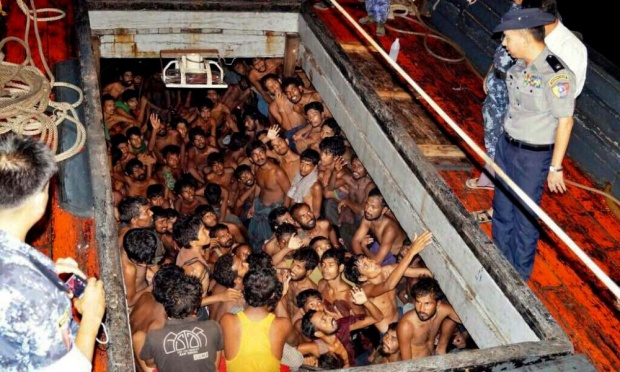 The UN High Commissioner for Refugees has stated there are still thousands of Rohingya and Bangladeshi refugees stranded at sea, half of whom have been confined to their boats for more than a month. Many of the refugees are facing severe food and water shortages, and rescuers from Malaysia, Thailand and Indonesia – including Sumatran fishermen who have taken it upon themselves to rescue refugees – have reported that a number of boat people are in grave condition. Meanwhile, on 24 May 2015, another mass grave containing hundreds of refugees was unearthed near one of the recently uncovered human trafficking camps in Malaysia. A number of the victims were found to be from Burma, demonstrating the desperation faced by thousands of refugees wishing to emigrate from the oppression faced back home.
The UN High Commissioner for Refugees has stated there are still thousands of Rohingya and Bangladeshi refugees stranded at sea, half of whom have been confined to their boats for more than a month. Many of the refugees are facing severe food and water shortages, and rescuers from Malaysia, Thailand and Indonesia – including Sumatran fishermen who have taken it upon themselves to rescue refugees – have reported that a number of boat people are in grave condition. Meanwhile, on 24 May 2015, another mass grave containing hundreds of refugees was unearthed near one of the recently uncovered human trafficking camps in Malaysia. A number of the victims were found to be from Burma, demonstrating the desperation faced by thousands of refugees wishing to emigrate from the oppression faced back home.
Burma’s discriminatory treatment of the Rohingya continues to fuel the refugee crisis in the Andaman Sea. Over the past weekend, President Thein Sein approved the Population Control Health Care Bill, which enshrines into law the authority for state governments to determine birth-spacing guidelines in regions that are deemed to be facing high population growth, thus potentially acting as a tool for religious and ethnic discrimination. This repressive and discriminatory bill, a component of the controversial Race & Religion Protec tion Laws, has been supported by an influential group of ultra-nationalist Buddhist monks, such as the notorious Wirathu. The group has long spearheaded the hate campaign against Burmese Muslims of which many analysts claim is politically motivated by elements within the state apparatus.
• • •Human Rights at the Bottom of the Andaman Sea
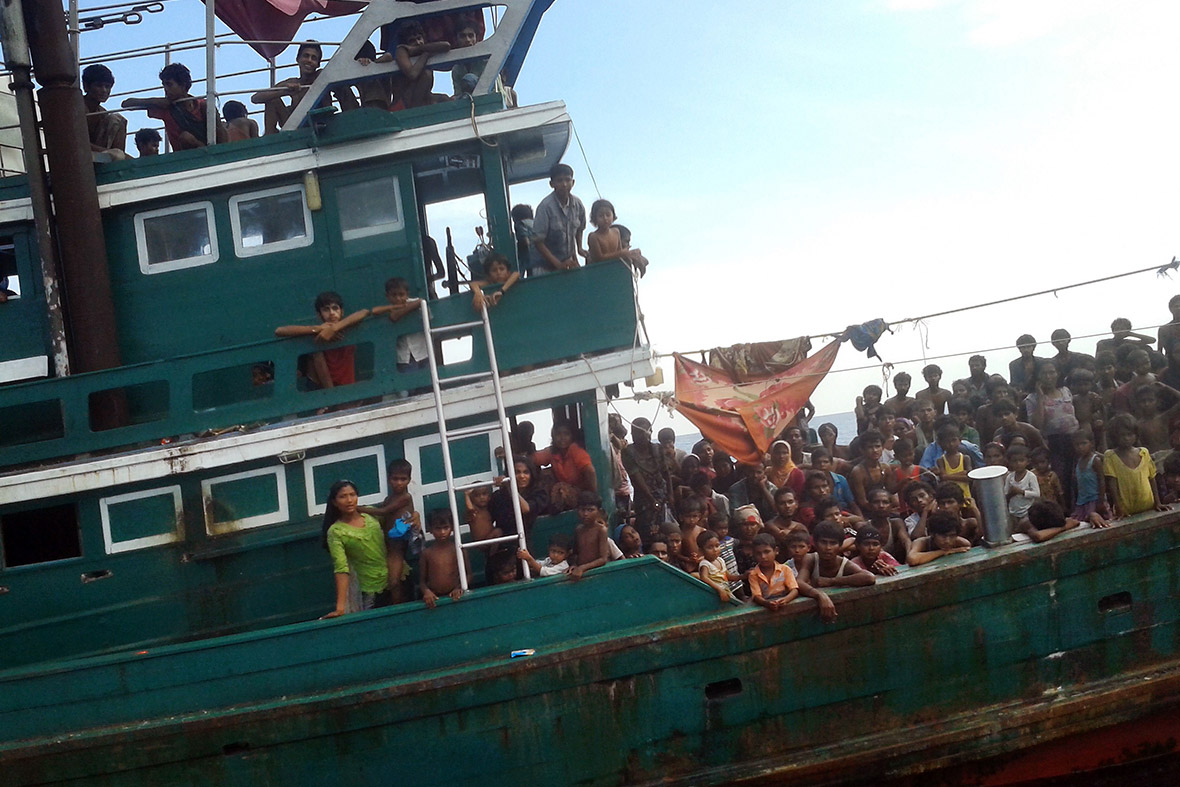 Earlier this week, two boats containing 600 refugees from Burma – mainly Muslim Rohingya – were turned away from the shores of Malaysia, having fled oppression under the Burma Government. They had been at sea for over two months and faced severe dehydration, starvation, and sickness. According to the International Office for Migration, there may be up to 8,000 still stranded at sea, many of whom will perish unless the international community provides urgent and substantive support. The scale of the exodus from Burma is alarming; according to the UN, this year alone more than 25,000 refugees have left Burma and Bangladesh for the shores of Thailand, Indonesia and Malaysia.
Earlier this week, two boats containing 600 refugees from Burma – mainly Muslim Rohingya – were turned away from the shores of Malaysia, having fled oppression under the Burma Government. They had been at sea for over two months and faced severe dehydration, starvation, and sickness. According to the International Office for Migration, there may be up to 8,000 still stranded at sea, many of whom will perish unless the international community provides urgent and substantive support. The scale of the exodus from Burma is alarming; according to the UN, this year alone more than 25,000 refugees have left Burma and Bangladesh for the shores of Thailand, Indonesia and Malaysia.
Many have been identified as Rohingya, Burma’s most persecuted religious minority population. For decades, the Rohingya have been systematically denied citizenship by their oppressive, military-backed government and subjected to repressive and discriminatory legislation, widespread and systematic human rights abuses, and violence that Human Rights Watch has classified as ethnic cleansing. Since 2012, hundreds have died and more than 140,000 have been displaced from their homes and villages. At the very least, the Burma authorities have been criminally negligent as regards the Rohingya; in many cases they were reportedly complicit in the violence. The Burma Government has shown no willingness to even investigate the violence, let alone prosecute those responsible.
• • •Familiar Blocks on the Road to Peace
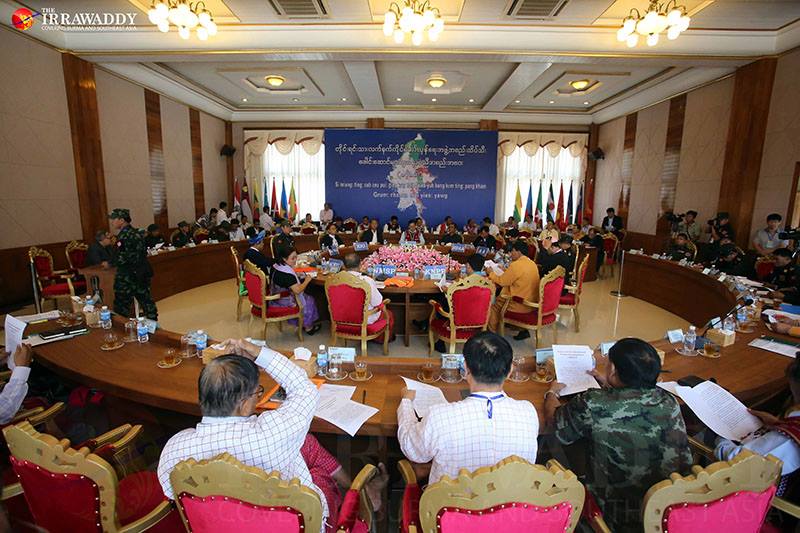 As the ethnic armed groups’ summit in Panghsang, Shan State concluded on 6 May 2015, familiar obstacles still loom large in the peace process. Namely, the 2008 Constitution, continued attacks and human rights violations committed by the Burma Army, and a lack of trust. Various commentators and organizations, including Burma Partnership, sounded words of caution after the over excitement caused by the agreement in principle of the draft nationwide ceasefire agreement (NCA), and those words of caution are salient today as peace remains out of sight.
As the ethnic armed groups’ summit in Panghsang, Shan State concluded on 6 May 2015, familiar obstacles still loom large in the peace process. Namely, the 2008 Constitution, continued attacks and human rights violations committed by the Burma Army, and a lack of trust. Various commentators and organizations, including Burma Partnership, sounded words of caution after the over excitement caused by the agreement in principle of the draft nationwide ceasefire agreement (NCA), and those words of caution are salient today as peace remains out of sight.
The summit in Panghsang, territory controlled by the United Wa State Army (UWSA), brought together 12 major ethnic armed groups for talks that lasted six days. Groups that were present included those bearing the brunt of Burma Army offensives the past few weeks, the Kachin Independence Organization (KIO), the Ta’ang National Liberation Army (TNLA), the Arakan Army (AA), and the Myanmar National Democratic Alliance Army (MNDAA). In fact, as talks were being held, the Burma Army attacked Kachin Independence Army (KIA) positions with airstrikes. It is not just the armed groups themselves who are bearing the brunt of attacks, but horrific human rights violations committed by the Burma Army on fleeing ethnic Kokang villagers, such as extrajudicial killings, including beheadings, are creating deep-seated fear among those who have been displaced by the conflict, but who are being pressured to return by Burma authorities […]
• • •World Press Freedom Day or World Press Restrictions Day?
Sunday 3 May, 2015 was World Press Freedom Day and the Burma Army embraced the sentiment of this day by issuing a gaging order on the media, aimed at stopping them from reporting on statements by the ethnic armed group, the Myanmar National Democratic Alliance Army (MNDAA) with which the Burma Army is at war with. Meanwhile, 12 journalists remain in prison, demonstrating why the Committee to Protect Journalists (CPJ) designated Burma as the 9th most censored country in the world.
Five of the most high profile incarcerated media workers, four journalists and the chief executive officer of the Unity Journal, have been in prison since reporting on a secret chemical weapons factory of the Burma Army in January 2014. They are serving seven years with hard labor after being charged under the colonial-era State Secrets Act. International human rights group, Amnesty International, brought attention to this issue on World Press Freedom Day, encouraging supporters to post ‘#FreeUnityFive’ on the Burma Government’s Information Minister’s Facebook wall. It is not just the Unity five that are in prison. Seven more media workers spent World Press Freedom Day without their freedom, including five from the Bi-Midday Sun newspaper and two from the Myanmar Post Weekly […]
• • •Hopes Shattered a Year on from Burma’s ASEAN Chairmanship
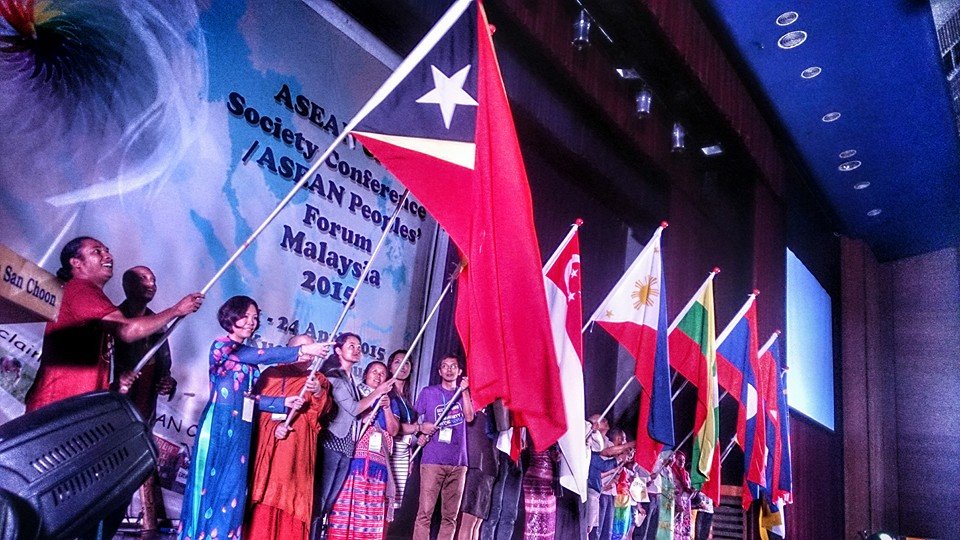 The Association of Southeast Asian Nations (ASEAN) Civil Society Conference/ASEAN Peoples’ Forum 2015 (ACSC/APF) ended on 24 April 2015 in Kuala Lumpur, Malaysia, bringing the voices of the people of ASEAN together in its yearly three day event. It reminds us of the historic ACSC/APF 2014 that was held for the first time in Burma and the hopes raised and duly dashed since that forum in the past year. As civil society throughout the region strives for better promotion, protection and respect for human rights, a review of the human rights situation and democratic reforms in Burma over the past year represent dreams turning into nightmares.
The Association of Southeast Asian Nations (ASEAN) Civil Society Conference/ASEAN Peoples’ Forum 2015 (ACSC/APF) ended on 24 April 2015 in Kuala Lumpur, Malaysia, bringing the voices of the people of ASEAN together in its yearly three day event. It reminds us of the historic ACSC/APF 2014 that was held for the first time in Burma and the hopes raised and duly dashed since that forum in the past year. As civil society throughout the region strives for better promotion, protection and respect for human rights, a review of the human rights situation and democratic reforms in Burma over the past year represent dreams turning into nightmares.
Events at the ACSC/APF 2015 involving Burma included a theatre play by Burma’s students and youth depicting the events of Letpadan, where over 100 students and supporters were detained after a violent attack by police and hired thugs on the column of students marching from Mandalay to Rangoon. The play called for the government to release the 79 student protesters and their supporters that remain in jail. The ASEAN Youth Forum labelled this strive for education reform by Burma’s students as an “endless and painful struggle.” Events brought to mind previous student demonstrations and consequent crackdowns such as in 1974, 1988 and 1996, all of which were committed by overtly military regimes. It begs the question; what has changed? […]
• • •On U Win Tin Blue Shirt Day, Remember Burma’s Many Political Prisoners
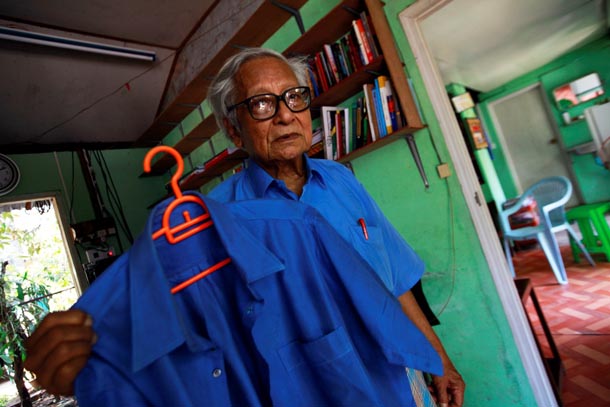 Today, Tuesday 21 April 2015, is the first anniversary of the death of U Win Tin – journalist, democracy activist, founding member of the NLD, and one of Burma’s most high profile and respected political prisoners who spent over 19 years in prison. When he was eventually released in 2008, he refused to hand back his blue prison shirt, and vowed to wear a blue shirt every day until all political prisoners were released, saying: “If there are no political prisoners … I will take off my shirt, but up until now I haven’t seen good indications.” Sadly, despite the many promises made by President Thein Sein to release all political prisoners, U Win Tin continued wearing a blue shirt until the day he died, one year ago.
Today, Tuesday 21 April 2015, is the first anniversary of the death of U Win Tin – journalist, democracy activist, founding member of the NLD, and one of Burma’s most high profile and respected political prisoners who spent over 19 years in prison. When he was eventually released in 2008, he refused to hand back his blue prison shirt, and vowed to wear a blue shirt every day until all political prisoners were released, saying: “If there are no political prisoners … I will take off my shirt, but up until now I haven’t seen good indications.” Sadly, despite the many promises made by President Thein Sein to release all political prisoners, U Win Tin continued wearing a blue shirt until the day he died, one year ago.
In fact, the number of political prisoners has increased markedly over the last year. According to the Assistance Association for Political Prisoners, as at the end of March, 173 political prisoners remained incarcerated in Burma, with a further 316 activists awaiting trial for conducting political activities. Furthermore, students, garment workers, farmers and journalists have all borne the brunt of the state’s repression. In March alone, 92 people were charged for their civil and political rights activities, with 31 arrested and seven sentenced, mostly as a result of the well-documented student protests in Letpadan and Rangoon in early March […]
• • •Burma’s NCA Takes Another Chaotic Turn
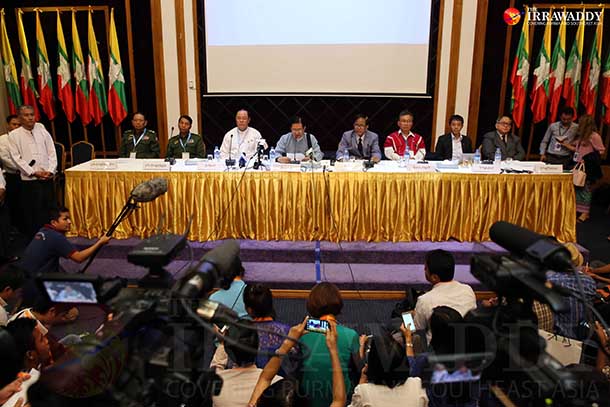 On 31 March, 2015, a signing ceremony took place in Rangoon involving members of the Nationwide Ceasefire Coordination Team (NCCT) and the Union Peace Working Committee (UPWC), and observed by President Thein Sein. Contrary to initial fervour around this event, this was not the actual signing of the nationwide ceasefire agreement (NCA). Rather, it was to agree in principle to a draft text that may be signed in the future. Many more difficult negotiations and hard compromises are still to happen. The next step, and this is not an insignificant rubber stamp of approval, is for the ethnic representatives to take this draft back to their respective organizations and alliances such as the United Nationalities Federal Council (UNFC), for discussions and decisions to be made as to whether this draft text of the NCA will be signed. This may well be made at a conference of ethnic armed groups (EAGs) towards the end of April.
On 31 March, 2015, a signing ceremony took place in Rangoon involving members of the Nationwide Ceasefire Coordination Team (NCCT) and the Union Peace Working Committee (UPWC), and observed by President Thein Sein. Contrary to initial fervour around this event, this was not the actual signing of the nationwide ceasefire agreement (NCA). Rather, it was to agree in principle to a draft text that may be signed in the future. Many more difficult negotiations and hard compromises are still to happen. The next step, and this is not an insignificant rubber stamp of approval, is for the ethnic representatives to take this draft back to their respective organizations and alliances such as the United Nationalities Federal Council (UNFC), for discussions and decisions to be made as to whether this draft text of the NCA will be signed. This may well be made at a conference of ethnic armed groups (EAGs) towards the end of April.
The instant headlines around this event were misleading, and international actors were indeed, misled. The UN Special Advisor for Myanmar, Vijay Nambiar, called the event “a historic and significant achievement” while the European Union said the agreement “bears testimony to the political courage and commitment of all sides to resolve grievances through dialogue rather than armed conflict.” Domestically, however, this praise was not reciprocated, as many Burmese political commentators and civil society criticized the signing on social media. This is hardly surprising because as of yet, key issues have been delayed and pushed back for later talks. These issues include a code of conduct, a monitoring mechanism for the ceasefire, interim arrangements before political dialogue begins, disarmament, demobilization, and reintegration (DDR), and security sector reform (SSR).
• • •Time for Honesty Around Peace and Conflict
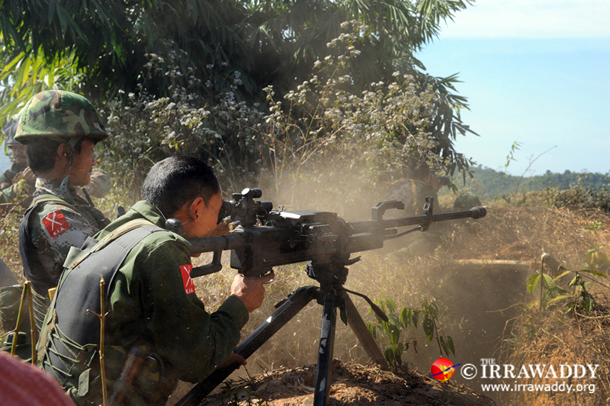 Peace talks resumed after a six month hiatus between the Burma Governments’ Union Peace-making Work Committee (UPWC) and the alliance of ethnic armed groups, the Nationwide Ceasefire Coordination Team (NCCT). Yet in an extraordinary display of hypocrisy, the Burma Army began airstrikes again against the Kachin Independence Army (KIA), just as the talks paused for a week-long break. This is to complement the airstrikes currently targeting the Myanmar National Democratic Alliance Army (MNDAA) in northern Shan State.
Peace talks resumed after a six month hiatus between the Burma Governments’ Union Peace-making Work Committee (UPWC) and the alliance of ethnic armed groups, the Nationwide Ceasefire Coordination Team (NCCT). Yet in an extraordinary display of hypocrisy, the Burma Army began airstrikes again against the Kachin Independence Army (KIA), just as the talks paused for a week-long break. This is to complement the airstrikes currently targeting the Myanmar National Democratic Alliance Army (MNDAA) in northern Shan State.
The Burma Government, through its proxies the UPWC and the Myanmar Peace Center, consistently attempts to dominate the discourse surrounding the peace talks, eschewing positive conclusions whenever talks happen. Time and time again the media is told that the signing of a nationwide ceasefire accord (NCA) is ‘just round the corner,’ or in this case, ‘within days.’ How can the signing of the NCA be within days if the Burma Army has opened two fronts on its war against ethnic armed groups? Furthermore, although the MNDAA is part of the NCCT, they have been excluded from the most recent peace talks, with the Government and the Burma Army steadfastly refusing to consider any method of engagement with them apart from through military means. There needs to be honesty from the government on the realities of the prospects for peace so that parties concerned, including the donors and civil society, are able to contribute and help steer the process instead of losing trust in it […]
• • •The Persecution Goes On With Nowhere to Seek Justice
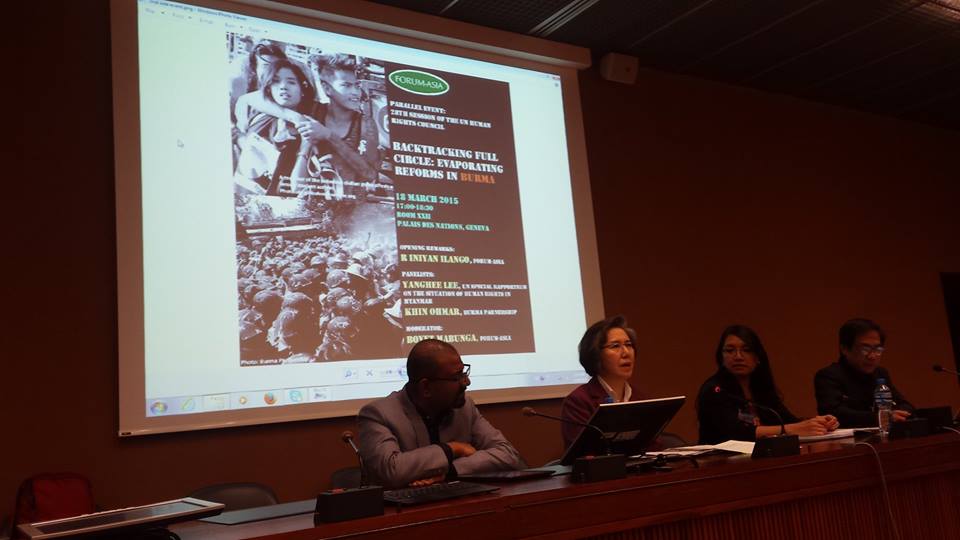 The persecution of the students and their supporters shows no sign of abating as around a hundred are still locked up and others are in hiding as authorities hunt them down. Meanwhile their supporters are being intimidated across Burma by intelligence unit, Special Branch, as well as administration and immigration authorities. Perhaps fittingly, this was occurring while the Special Rapporteur on the situation on human rights in Burma, Yanghee Lee, was giving her report to the UN Human Rights Council (HRC) in Geneva, where she highlighted “continuing challenges indicating worrying signs of backtracking on key human rights issues.” We must thank Ms. Yanghee Lee for bringing the multitude of human rights abuses to the attention of the member states in a comprehensive report, especially in the light of the sexist abuse she has been subjected to by extremist monks in Burma.
The persecution of the students and their supporters shows no sign of abating as around a hundred are still locked up and others are in hiding as authorities hunt them down. Meanwhile their supporters are being intimidated across Burma by intelligence unit, Special Branch, as well as administration and immigration authorities. Perhaps fittingly, this was occurring while the Special Rapporteur on the situation on human rights in Burma, Yanghee Lee, was giving her report to the UN Human Rights Council (HRC) in Geneva, where she highlighted “continuing challenges indicating worrying signs of backtracking on key human rights issues.” We must thank Ms. Yanghee Lee for bringing the multitude of human rights abuses to the attention of the member states in a comprehensive report, especially in the light of the sexist abuse she has been subjected to by extremist monks in Burma.
Of over 100 students and supporters arrested and imprisoned after a brutal crackdown by police and hired thugs in Letpadan, Pegu Region on 10 March 2015, around eighty remain in Tharyawaddy prison. While 127 is the official number of arrests on March 10, there were at least 10 more arrested following the Letpadan crackdown in Rangoon, Dawei, and the Irrawaddy area. Families have been denied access to visit their sons and daughters, with guards refusing to let them in to speak to them or deliver basic items, nor do they receive regular updates on their health. Furthermore, some are still in hiding as the authorities are searching houses using the 2012 enacted, “Ward or Village Tract Inspection Law.” This law, highlighted by Fortify Rights this week in their report, “Midnight Intrusions: Ending Guest Registration and Household Inspections in Myanmar” stipulates that homeowners need to register any house guests with local authorities. This gives the police carte blanche to enter any persons home at any time, superficially to conduct a periodic household inspection. It is used to target political activists and is being used now in their hunt for the students in hiding.
• • •Following Vicious Student Crackdowns, EU Must Stop Training Thugs
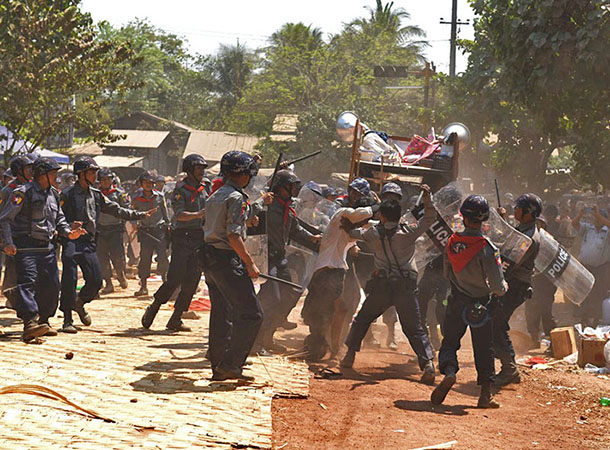 Burma has once again been in the international headlines for all the wrong reasons. Rather than making headlines for, say, realizing a sustainable peace settlement between the Burma authorities and the country’s various ethnic nationalities, or blazing a trail with genuine political reforms in the lead-up to supposedly historic and seminal general elections, Burma has reverted to type. On 10 March 2015 police launched a violent and cold-blooded crackdown on student activists in Letpadan, Bago Region, brutally assaulting students, monks, ambulance workers and journalists, and arresting scores more. Their “crime” – protesting against the undemocratic National Education Law. The same day, another group of protestors was forcibly dispersed in Rangoon. Their “crime” – protesting against the violence in Letpadan.
Burma has once again been in the international headlines for all the wrong reasons. Rather than making headlines for, say, realizing a sustainable peace settlement between the Burma authorities and the country’s various ethnic nationalities, or blazing a trail with genuine political reforms in the lead-up to supposedly historic and seminal general elections, Burma has reverted to type. On 10 March 2015 police launched a violent and cold-blooded crackdown on student activists in Letpadan, Bago Region, brutally assaulting students, monks, ambulance workers and journalists, and arresting scores more. Their “crime” – protesting against the undemocratic National Education Law. The same day, another group of protestors was forcibly dispersed in Rangoon. Their “crime” – protesting against the violence in Letpadan.
The grim details tell a shocking story of callousness, cruelty and chaos: medical workers beaten by police through the open doors of ambulances as they attended to the wounded; journalists attacked and arrested for recording police violence, despite wearing press badges to identify themselves; students hit with batons and stamped upon even after they had been detained; monks arrested merely for supporting the student protestors and giving them sanctuary in the Aungmyay Beikman monastery in Letpadan; and protestors dragged out of houses where they had been sheltering from the violence and arrested by police going around the local area door-to-door […]
• • •
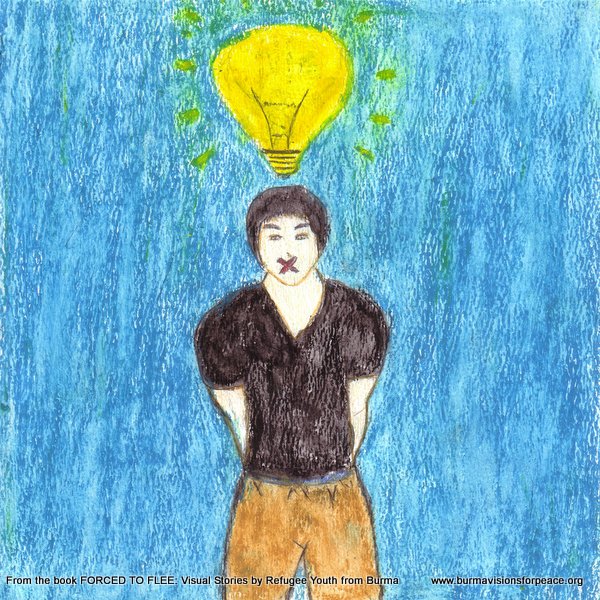








 All posts
All posts